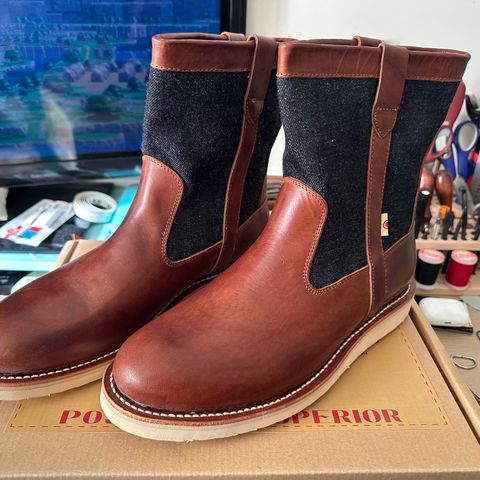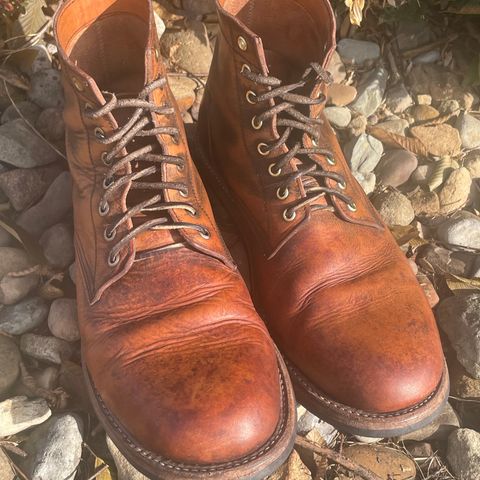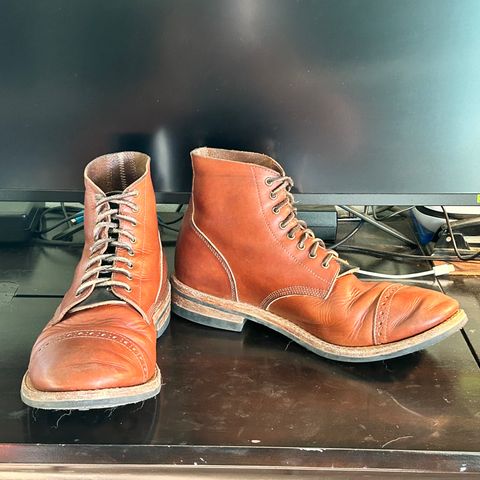Tempesti
TanneryAbout
Tempesti is an Italian tannery specializing in vegetable-tanned leather production, located in Tuscany between Pisa and Florence. Founded in 1946 by brothers Tullio and Osvaldo Tempesti, the company has remained family-owned through four generations and continues to operate using traditional tanning methods along the banks of the Arno River. Tempesti is a founding member of the Consorzio Vera Pelle Italiana Conciata al Vegetale, the consortium established in 1994 to preserve and promote authentic Italian vegetable-tanned leather craftsmanship.
About
Tempesti is an Italian tannery specializing in vegetable-tanned leather production, located in Tuscany between Pisa and Florence. Founded in 1946 by brothers Tullio and Osvaldo Tempesti, the company has remained family-owned through four generations and continues to operate using traditional tanning methods along the banks of the Arno River. Tempesti is a founding member of the Consorzio Vera Pelle Italiana Conciata al Vegetale, the consortium established in 1994 to preserve and promote authentic Italian vegetable-tanned leather craftsmanship.
The tannery produces double shoulders and single butts for footwear, handbags, belts, and small leather goods, with their classic product lines including Maine and Elbamatt leathers. Their vegetable tanning formula has remained unchanged for nearly 75 years, using a process that includes drum-dyeing and treatment with a mixture of vegetable and animal oils. Tempesti leather appears in heritage footwear from bootmakers including Viberg and Tricker's, who value the material's aging characteristics and traditional production methods.
History
The Tempesti family's involvement in leather tanning dates to the early 1900s, when Giovanni Tempesti established the family's tanning tradition. His grandsons, Tullio and Osvaldo Tempesti, founded the modern tannery in 1946 in the Tuscan region between Pisa and Florence. The business passed to the third generation when cousins Giovanni and Giovanna assumed management during the 1970s and 1980s. As of 2024, the fourth generation of the Tempesti family operates the tannery, maintaining the production methods and formula established by the founders.
The tannery's location in Tuscany connects it to a regional leather manufacturing heritage extending back to the Etruscans in the eighth century BCE. This long-standing tradition of leather production in the Arno River valley provided both technical knowledge and access to natural resources essential for vegetable tanning.
Location and regional significance
Tempesti operates in Tuscany, Italy, specifically in the area between Pisa and Florence along the banks of the Arno River. This location places the tannery within a region with documented leather manufacturing history spanning more than 2,700 years. The Arno River valley has supported leather tanning operations since Etruscan civilization in the eighth century BCE, with the river providing water essential to the tanning process and the surrounding area offering access to the vegetable tannins used in traditional leather production.
The concentration of tanneries in this Tuscan region led to the formation of industry organizations aimed at preserving traditional methods and maintaining quality standards for Italian vegetable-tanned leather.
Production methods and products
Tempesti specializes exclusively in vegetable-tanned leather production, using a formula that has remained unchanged for nearly 75 years. The tanning process relies on natural tannins rather than chrome or synthetic chemicals, following traditional methods preserved through four generations of family ownership. After tanning, the leather undergoes drum-dyeing and receives treatment with a mixture of vegetable and animal oils and greases, which contributes to the material's characteristic soft touch and smooth finish.
The tannery produces leather in two primary forms: double shoulders and single butts. These cuts serve manufacturers of footwear, handbags, belts, and small leather goods. Tempesti's classic product lines include Maine and Elbamatt, with the Elbamatt line representing heavyweight vegetable-tanned cowhide made from selected European rawhides. The Elbamatt Liscio variant features hand-selected cow butt hides chosen for tight and pliable grain structure, which enables clean creasing and deep patina development over time.
The leather receives its color through environmentally friendly aniline drum dyeing processes that allow the natural grain pattern to remain visible. Final finishing includes hand stuffing with natural greases, which adds to the leather's durability and aging characteristics. All Tempesti products comply with the specifications established by the Consorzio Vera Pelle Italiana Conciata al Vegetale for authentic Italian vegetable-tanned leather.
Industry leadership
In 1994, Tempesti became a founding member of the Consorzio Vera Pelle Italiana Conciata al Vegetale, an industry organization established to preserve traditional Italian vegetable tanning methods and maintain quality standards for the designation. Giovanni Tempesti, representing the third generation of family ownership, served as one of the consortium's presidents, contributing to the establishment of specifications and standards for member tanneries.
The consortium provides authentication for vegetable-tanned leather produced using traditional Italian methods, with member tanneries required to meet specific criteria regarding tanning materials, processes, and environmental practices. All Tempesti leather production complies with these consortium specifications, allowing the company to use the consortium's certification on their products.
Heritage footwear applications
In June 2023, Viberg released the Tempesti Collection featuring Elbamatt leather in three distinct colors. The collection included boots built on three different lasts: the 2055 flat-toe Munson last, the 2040 last based on 1940s work boot patterns, and the 2030 Canadian Parade last. Viberg selected Elbamatt for this collection based on the leather's aging characteristics and the nearly 75-year-old tanning formula used in its production.
References
"Storia". Tempesti. Retrieved October 20, 2025.
"Tempesti". Consorzio Vera Pelle Italiana Conciata al Vegetale. Retrieved October 20, 2025.
"Tempesti Collection". Viberg. June 2023. Retrieved October 20, 2025.


























































